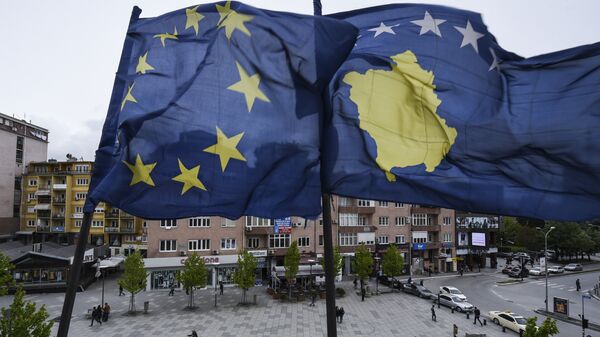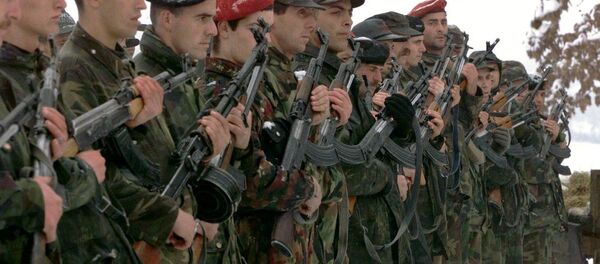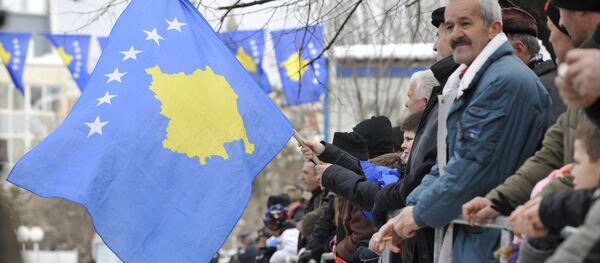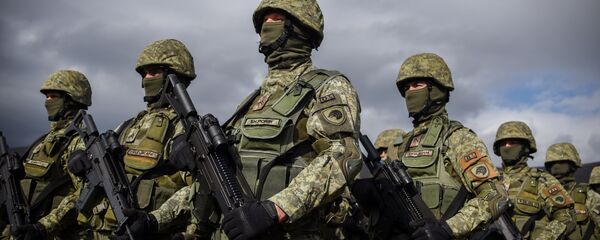The interview came after Daut Haradinaj, a member of the Kosovo Assembly, said that if France extradited his brother Ramush Haradinaj to Serbia, "not a single Serb would remain in Kosovo."
He went even further by saying that if his brother was extradited to Serbia, Belgrade would receive the same response as in 1999.
On the occasion of the 13th anniversary of the pogrom against #Kosovo Serbs, commemoration service was served at Gračanica Monastery today pic.twitter.com/A5mwTcUNvt
— Sava Janjic (@SavaJanjic) 17 марта 2017 г.
While NATO was bombing Serbia and Montenegro, then part of Yugoslavia, between March 24, 1999 and June 10, 1999, the terrorist Kosovo Liberation Army (KLA) was engaged in an ethnic cleansing campaign against ethnic Serbians residing in the region.
Former Kosovo Prime Minister Ramush Haradinaj, one of the former leaders of the KLA, was detained in France in January 2017 on an international arrest warrant that had been filed by Belgrade in 2004.
While the world celebrates, we remember the pogrom of Kosovo Serbs on this day in 2004. This didn't make the news in Canada & the USA at all pic.twitter.com/HDd1ljMsTw
— St. Nicholas Church (@StNicholasHamON) 17 марта 2017 г.
On April 27, the prosecutor's office is due to announce a decision on his extradition to Serbia, where he is accused of committing war crimes against ethnic Serbian civilians in Kosovo between 1998 and 1999.
Commenting on the matter, Aleksandar Pavich said that the Serbian minority in Kosovo has never felt safe there, and that Daut Haradinaj's statement is "symptomatic."
"The statement indicates that Kosovo Albanians are used to a culture of impunity, because they have patrons who use them to fulfil their geopolitical goals. I'm not surprised that there has been no reaction from Brussels, which is always friendly about any controversial statement by Pristina," he said.
Kosovo political scientist Stefan Filipovic, for his part, told Sputnik Serbia that Kosovo Serbs were not surprised by Haradinaj's statement, which he described as a mix of "indiscretion, emotions, and pre-election trickery."
"We have been living in such circumstances since 1999, and threats are often not limited to mere words. What is most embarrassing is that Kosovo authorities are keeping mum on the issue," according to Filipovic.
"I do not think that the current situation will lead to the pogroms of March 17, 2004, when several dozen people were killed, more than 4,000 Serbs expelled from their homes in two days, over 900 houses and around 30 Orthodox churches burnt. But in any case one should be careful because [pogrom-like] incidents can occur in the villages where the Serbs are returning," he said.
Filipovic added that in Kosovo's northern areas, statements similar to Daut Haradinaj's remarks can affect the ongoing normalization of inter-ethnic relations.
Earlier this month, Serbian First Deputy Prime Minister and Minister of Foreign Affairs Ivica Dacic said that Kosovo President Hashim Thaci had sought to provoke Belgrade by stating that Pristina was planning to file a lawsuit against Serbia for committing "genocide" in Kosovo.
Dacic noted that Kosovo was not a member of the United Nations and therefore had "no right for a lawsuit against Serbia in the Hague." He added that the UN International Criminal Tribunal for the Former Yugoslavia had never accused Serbia of genocide and that the UN had, in fact, established a special court for addressing KLA war crimes.
Kosovo unilaterally proclaimed independence in 2008 and is recognized by over 100 UN member states. Serbia, as well as Russia, China, Israel, Iran, Spain, Greece and some other countries do not recognize Kosovo's independence.
Never miss a story again — sign up to our Telegram channel and we'll keep you up to speed!





